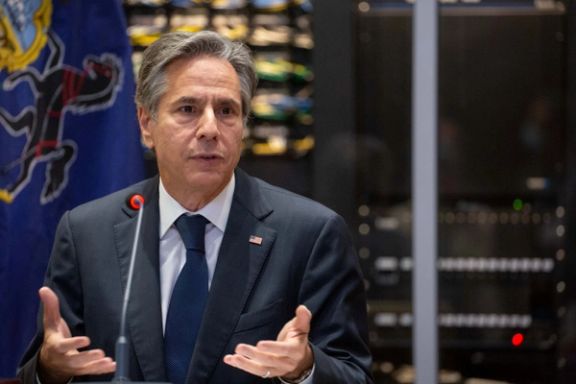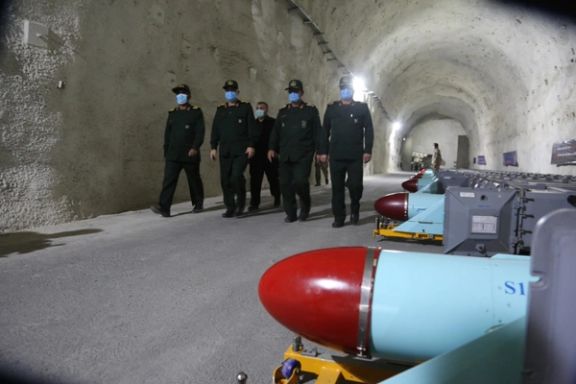Blinken Tells Russia 'We Share Interest' Against Iran Nukes

US Secretary of State Antony Blinken Thursday told his Russia counterpart, Sergei Lavrov that the two countries have a shard interest in preventing Iran from obtaining nuclear weapons.

US Secretary of State Antony Blinken Thursday told his Russia counterpart, Sergei Lavrov that the two countries have a shard interest in preventing Iran from obtaining nuclear weapons.
In a meeting of 57 foreign ministers in Stockholm, Sweden, Blinken who was urging cooperation with Russia said, “we have shared interests that we are working on together, including a shared interest in Iran not acquiring a nuclear weapon. Our colleagues are working together in Vienna as the talks proceed.”
Russia is one of six countries who negotiated and signed the 2015 nuclear agreement, the Joint Comprehensive Plan of Action, or JCPOA. The US pulled out of the agreement in 2018, but Russia, China, the United Kingdom, France and Germany who remained in the deal are holding talks with Iran to see if they could revive the agreement.
Russia is Iran’s diplomatic ally and generally backs Tehran’s position in the nuclear dispute, but Russia’s interests in the region also present a complicated picture, as it cultivates good relation with some of Tehran’s regional rivals.
Blinken referred to shared interests on Iran as he was warning Lavrov about Russia taking aggressive action against Ukraine. In recent days, European countries have become alarmed at Russian military moves that could signal action against Ukraine.

Iran has presented two new sets of proposals in the Vienna nuclear talks, its lead negotiator Ali Bagheri Kani told Iranian news agencies Thursday.
Bagheri Kani said these could alter whatever was agreed before talks were suspended in June. “There is a new government in Iran, and a new negotiating team,” he said. “We need changes in the text.”
After four months of talks earlier this year, diplomats suggested there was 70-80 percent agreement over renewing Iran’s 2015 nuclear agreement with world powers, the JCPOA (Joint Comprehensive Plan of Action), which the United States left in 2018. The talks formally involve remaining JCPOA signatories – China, France, Germany, Iran, Russia and the United Kingdom – with the US taking part indirectly.
Bagheri Kani said that whatever was agreed previously had been a “draft” and that there was “no doubt” it was open to renegotiation.
Iran’ new proposals, he said, covering both sanctions and Tehran’s nuclear program had been circulated in writing to all JCPOA members. A European diplomat in Vienna confirmed to Reuters that draft documents had been received.
Bagheri Kani said he had already fielded questions, referring apparently to meetings with Enrique Mora, the senior European Union official chairing the talks, and the Russian delegation. The Iranian diplomat said there was a need for “new negotiations about these documents.”
Bagheri Kani gave no indication as to what precise proposals were in the Iranian texts. Talks before April struggled to agree precisely which US sanctions violate the JCPOA and exactly how the Iranian nuclear program, expanded and enhanced since 2019, should be brought back to limits set by the JCPOA.
Bagheri Kani stressed the “international dimension” of the talks. He said that “players outside the direct theatre” were “trying to create diversions and disruptions in the nuclear talks.” It was not clear whether he was referring to the US, or to Israel, which has made a range of recent accusations over Iran’s nuclear program and, after Wednesday’s International Atomic Energy Agency report highlighting Iran’s use of advanced centrifuges at its Fordow enrichment plant, called on world powers to leave Vienna.
With Thursday the fourth day of what are the seventh round of talks, Bagheri Kani said the Iranian delegation was ready to stay in Vienna as long as was necessary, but that other delegations might prefer to return to their capitals for consultation over the new Iranian texts.
“Of course, the other side can express their opinions about these changes,” Bagheri Kani said. “Many have been saying Iran is not serious and doesn’t want to talk and reach results. These proposals show Iran is serious.”

Israel on Thursday called on world powers to halt nuclear talks with Iran immediately, citing a UN watchdog's report that Tehran has started enriching uranium with more advanced centrifuges.
"Iran is carrying out nuclear blackmail as a negotiating tactic, and this should be answered by the immediate halt to negotiations and the implementation of tough steps by the world powers," Prime Minister Naftali Bennett's office quoted him as saying in a call with US Secretary of State Antony Blinken.
The International Atomic Energy Agency (IAEA) announced Wednesday that Iran has started enrichment up to 20 percent at Ferdow with one cascade, or cluster, of 166 advanced IR-6 machines. The agency said Iran had also installed but was not yet operating another 94 IR-6 machines in a cascade at Fordow.
Tehran has accelerated higher degree of uranium enrichment this year, after its parliament passed a law in December 2020 demanding US lift economic sanctions. Uranium is being enriched to 20 and 60 percent purity and Iran has accumulated more than 200 kg of fissile material that could enable it to produce a nuclear weapon in a matter of weeks.
With reporting by Reuters

In its latest breach of limits set by its 2015 nuclear deal, Iran has begun producing enriched uranium with advanced centrifuges at its underground Fordow plant.
The United Nations atomic watchdog, the International Atomic Energy Agency (IAEA), reported the move Wednesday on the third day of talks in Vienna designed to revive the 2015 agreement, the JCPOA (Joint Comprehensive Plan of Action).
European diplomats flagged up to journalists Monday Iran’s use of more advanced centrifuges, the devices used to enrich uranium. The JCPOA limited Tehran to 5060 IR-1 machines, with a limited number of more advanced ones used purely for research.
A November report from the IAEA noted Iranwas running IR-4 and IR-6 centrifuges at the Natanz site to enrich to 60 percent, far above the 3.67 percent JCPOA cap. The IAEA also reported that Iran was enriching uranium with IR-1 centrifuges while testing IR-6 machines at Ferdow, a fortified underground plant where enrichment is banned under the JCPOA.
But Wednesday’s IAEA statement said Iran had now started enrichment up to 20 percent at Ferdow with one cascade, or cluster, of 166 advanced IR-6 machines. The agency said Iran had also installed but was not yet operating another 94 IR-6 machines in a cascade at Fordow.
According to a note circulated to IAEA member states and seen by some news agencies, Iran has agreed with the agency increased frequency of agency inspectors’ verification activities at Ferdow and “practical arrangements to facilitate implementation of these activities.”
Iran has expanded its nuclear program since 2019 in response to United States ‘maximum pressure sanctions’ introduced when previous president Donald Trump left the JCPOA in 2018. By exceeded the JCPOA enrichment cap of 3.67 percent and using more efficient centrifuges that increase the speed of enrichment, Tehran has effectively reduced ‘break out,’ the time required to produce enough 90-percent-enriched ‘weapon grade’ uranium for a crude nuclear device.
The continuing expansion of the program, even if it gives Iran greater leverage in Vienna, increases the talks’ challenge of agreeing exactly how Tehran’s nuclear activities can be brought back within JCPOA limits. The talks – which resume this week after a five-month break – failed from April to June to agree not just on this, but also on which US sanctions are incompatible with the JCPOA.
Iran has also since February reduced the level of its co-operation with the IAEA to that required under the Nuclear Non-Proliferation treaty, justifying this in part as a response to a series of attacks on its nuclear sites widely attributed to Israel.

State media reported Wednesday that Iran was willing to continue nuclear talks in Vienna and would not abandon its aims to meet deadlines set by other parties.
The English-language Press TV quoted a senior Iranian negotiator that Tehran would not
“sacrifice its principled demands and the Iranian nation’s rights, for mere artificial deadlines or timetables.” The negotiator told Press TV that Iran was in Vienna "with full seriousness" and had presented “transparent demands and proposals."
Diplomats from France, German and the United Kingdom (known as the E3) told reporters Tuesday that Europe would not impose unproductive deadlines in their attempts to revive the 2015 nuclear deal, the JCPOA (Joint Comprehensive Plan of Action).
Iranian state media − including Tasnim News Agency, which is affiliated to the Revolutionary Guards − are suggesting European Union parties to the talks want to wrap up the current round of talks quickly. France and Germany are EU members and the talks are chaired by Enrique Mora, a senior EU official.
The official news agency (IRNA) arguedthat European parties, under United States pressure, had taken "certain political and media strategies" to hinder talks and direct them away from any agreement. Mehr news agency reported that the Europeans "need… item-by-item consultation with the United States."
The US, which left the JCPOA in 2018 and imposed ‘maximum pressure’ sanctions on Iran, is taking part in Vienna only indirectly – with formal talks involving only remaining JCPOA signatories China, the E3, Iran, and Russia.
In a tweet Wednesday, Wall Street Journal correspondent Laurence Norman quoted a senior European diplomat that the end of this week was not a deadline. "We have brought big suitcases and we can stay through the weekend,” Norman wrote he was told. “This is the way it worked in the rounds so far that we worked until…the point where, mostly the Iranians, had to reconnect with their capitals.”
Talks to revive the JCPOA resumed Monday with Iran's negotiators insisting their aim was to see lifted all the sanctions levied since the US left the JCPOA in 2018. Two expert groups have been formed to discuss US sanctions, which have especially targeted Iran’s oil exports and financial sector.
On Wednesday envoys from JCPOA signatories attended a working group on nuclear issues.
Also Wednesday, Iran's lead negotiator and deputy foreign minister Ali Bagheri Kani met with Mora.

An unnamed Israeli official has said that the killing of an Iranian nuclear scientist last year did not slow down Tehran’s atomic program and more needs to be done.
Israel’s Channel 12 television quoted the official Tuesday as having said that Iran is closest to a nuclear weapon than it has ever been so far and Israel needs to push for a stronger international agreement with Iran, at the same time preparing a military option.
The unnamed official maintained that “there is a huge global Israeli effort — both publicly and behind the scenes — to push for an upgraded agreement as well as simultaneously building a large and significant attack plan.”
Mohsen Fakhrizadeh, known as one of the key figures in Iran’s nuclear program from its early days more than two decades ago, was shot dead in science fiction style in Tehran in November 2020. The sophisticated attack using an automated, remote controlled heavy gun mounted in a van, was largely attributed to Israel.
As the Biden Administration is pushing for reviving the 2015 nuclear agreement, Iran has made considerable advances in its nuclear program, unnerving Israel that believes the old agreement, the JCPOA, is already past its expiration date.